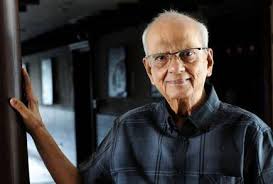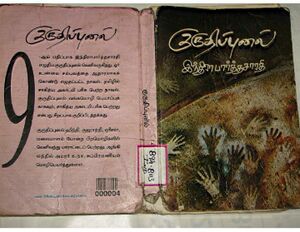Indira Parthasarathy: Difference between revisions
(Recomposed many sentences for better readability. replaced some transliterated words. highlighted important sentences . re-translated. corrected typos.) |
m (Recomposed some sentences for better readability) |
||
| Line 28: | Line 28: | ||
In Delhi, Ee.Paa was more recognised as a playwright than a novelist because the then popular magazine 'Enact’ published most of his plays in English translation. His historical plays such as ''<nowiki/>'Aurangazeb’'' and ''<nowiki/>'Ramanujar’'' are still very popular. | In Delhi, Ee.Paa was more recognised as a playwright than a novelist because the then popular magazine 'Enact’ published most of his plays in English translation. His historical plays such as ''<nowiki/>'Aurangazeb’'' and ''<nowiki/>'Ramanujar’'' are still very popular. | ||
After his retirement as a professor of Tamil from | After his retirement as a professor of Tamil from Delhi University, he was offered to work at Pondicherry university. He insisted to work as a professor of drama, and later became instrumental in forming its Department of Performing arts. | ||
He | He is conferred with a Doctorate by the Delhi University for his research on Alwars. The play ''<nowiki/>'Ramanujar''' was a result of these research and it later received 'Saraswathi Samman’ award. | ||
== Literary Significance == | == Literary Significance == | ||
Indira Parthasarathy has put forward the power struggles, games played by the pompous, intellectual complexities that are hallmarks of a metropolitan life in Tamil literature. Indira Parthasarathy’s works, through the subtle satire, depicts the attitudes of the bureaucrats and the politicians who holds the power directly and also that of clerical class who witnesses it everyday being part of that power centre and at the same time enslaved to it. His early novels such as 'Thanthira Bhoomi’ and 'Suthanthira Bhoomi’ are best examples. | Indira Parthasarathy has put forward the power struggles, games played by the pompous, intellectual complexities that are hallmarks of a metropolitan life in Tamil literature. Indira Parthasarathy’s works, through the subtle satire, depicts the attitudes of the bureaucrats and the politicians who holds the power directly and also that of clerical class who witnesses it everyday being part of that power centre and at the same time enslaved to it. His early novels such as 'Thanthira Bhoomi’ and 'Suthanthira Bhoomi’ are best examples. | ||
Revision as of 16:52, 17 August 2023
இந்தப் பக்கத்தை தமிழில் வாசிக்க: இந்திரா பார்த்தசாரதி
Indira Parthasarathy (Ee. Paa) (July 10, 1930) is one of the forerunners in modern Tamil literature. His literary achievement includes numerous novels, short stories and plays. He is a recipient of the PadmaShri Award. He received Sahitya Akademi Award for his novel 'Kuruthipunal' and is currently a 'fellow' in the Sahitya Akademi. He is a professor of Tamil literature with a high proficiency in English language, a Marxist with a deep knowledge of Vaishnava Bhakti literature.
Most of his novels deals with the life and psyche of the upper middle-class. They are satirical in nature and depict current metropolitan life mostly using fictional characters in government service.
Birth, Early life, Education
He was born as Parthasarathy. He generated his pen name by enjoining his wife's name 'Indira' to his own. Born on 10th July 1930 to a Tamil Vaishnavite family in Chennai, he grew up in Kumbakonam. Ee.paa went to school when he was 9 years old and was directly admitted to class six. He familiarised himself with Tamil literary personalities such as Thi.Janakariman and Karichchan Kunju at a young age. Thi. Janakiraman was also his schoolteacher. Ee.Paa had his Under-graduation from Kumbakonam Arts college and Post-graduation from Chidambaram Annamalai university.
Personal life
Indira Parthasarathy started his career as a Tamil teacher at the National College in Trichy in 1952. He later worked as a Tamil lecturer in Delhi University (1962-2002) and after his retirement there, became the Professor of Drama in the department of Performing Arts in Pondicherry University. For few years (1981-1986) he was a visiting professor of Indian philosophy and culture at the University of Warsaw in Poland. He has penned those abroad encounters in a novel 'Yesuvin Thozhargal' (Yesu's friends). He currently lives in Chennai.
Family
His family backdrop familiarised him to Vaishnava bhakti literature and piqued his interest in Marxism as well. Ee. Paa's father was an ardent Vaishnavite. On the other hand, His brother Venkatachari was involved in leftist politics. Ee.Paa inherited a passion to reading from his family. Both his grandmother and mother were voracious readers. He has used his wife’s first name for his nom de plume.
Literary Contribution
Short Stories
From an interview to Vikatan, he recalls that he wrote his first short story at the age of 15. It was about the increased number of young widows in an Agraharam (Brahmin locality).
His first short story that got published was in 1964, 'Manitha Enthiram' in the magazine, Anandha Vikatan as a signature story.
"The form of the short story is shaped by the unconscious mind of its author. It has no specific grammar. Forcing one to create a literary work in accordance with a particular theory is like saying that a woman who has studied medical science can only bear a child," says Ee.Paa. These principles of him can be applied to understand his novels as well.
Novels
His first novel 'Kaalavellam’ was published in 1968. He creates multi-dimensional characters in it and depicts interactions, synchronicity and contrasts between them to convey the vision in this and in all of his novels as well. Later, the novels he wrote satirically on Delhi's political milieu, Suthanthira bhoomi, Thanthira bhoomi brought him fame.
His autobiographical novel, 'Verpatru’ presents Ee.Paa inmost as a student and a literary figure to its readers.
He received Sahitya Akademi Award for his novel 'Kuruthippunal' (bloodbath) which presented the 1968 real incident: the caste-based massacre in Keezhvenmani Village, Thanjavur District, in a unique perspective. This novel saw him demonstrate that the caste/class divisions of people are not just determined by external factors such as economic conditions alone, but also internal factors such as their culture and myths.
Plays
Though Tamil literati had lost hopes on the literary form of Play, Ee. Paa was considerably attracted by it. His first play was 'Mazhai’. It was staged amidst various protests in Dakshina Bharata Nataka Sangam in Delhi by Bharathi Mani. This encouraged Ee.Paa to continue writing more plays. 'Porvai Portthiya udalgal' (bodies shrouded) is his most important work. It was a widely discussed work as its content was the existential crisis during the Emergency period imposed in India for 21 months between 1975-1977.
In Delhi, Ee.Paa was more recognised as a playwright than a novelist because the then popular magazine 'Enact’ published most of his plays in English translation. His historical plays such as 'Aurangazeb’ and 'Ramanujar’ are still very popular.
After his retirement as a professor of Tamil from Delhi University, he was offered to work at Pondicherry university. He insisted to work as a professor of drama, and later became instrumental in forming its Department of Performing arts.
He is conferred with a Doctorate by the Delhi University for his research on Alwars. The play 'Ramanujar' was a result of these research and it later received 'Saraswathi Samman’ award.
Literary Significance
Indira Parthasarathy has put forward the power struggles, games played by the pompous, intellectual complexities that are hallmarks of a metropolitan life in Tamil literature. Indira Parthasarathy’s works, through the subtle satire, depicts the attitudes of the bureaucrats and the politicians who holds the power directly and also that of clerical class who witnesses it everyday being part of that power centre and at the same time enslaved to it. His early novels such as 'Thanthira Bhoomi’ and 'Suthanthira Bhoomi’ are best examples.
Indira Parthasarathy wrote more about the human pretensions. It is a vision out of emotionless but of an intellectual research view. Hence, his fictions placed more emphasis on the Freudian psychology. It is the narrative style that delves into the psychology of the characters through the narration of the story itself.
In the seventies, Indira Parthasarathy moved towards the ideas of existentialism. Intellectual humor slowly moved towards the vision of meaninglessness. Indira Parthasarathy chose plays as its best form during this period. It is through these plays that Indira Parthasarathy is considered to be one of the pioneers of Tamil modern play. In particular, his ’Porvai Porthiya Udalgal’ is known to be the best realistic play then and even today. Indira Parthasarathy’s later novels have a satirical take on the decline of our politics. 'Mayamaan Vettai’, 'Vedapurathu Viyabarigal’ are the best examples of his satiric view.
He was born in a big city but raised in a small town. He is a collection of such oxymorons. But the fact that his novels do not define these psychological problems only on the economical grounds is an outcome of the contradictions that inherent in him.
Awards
- Sahitya Akademi Award
- Saraswathi Samman Award
- Sangeet Natak Akademy Award
- Bharatiya Bhasha Award
- Padma Shree (2010)
- The Hindu Lit for Life - The Lifetime achievement award.
- Sahitya Academy Fellowship
Works
Short Stories
He has written more than hundred short stories. They are published as several compilations by various publishers.
Novels
- Kaalavellam (1968)
- Aagasath Thamarai
- Maayamaan Vettai
- Thanthira Bhoomi
- Thiraigalukku Appal
- Saththiya Sothanai
- Kuruthipunal (Recipient of Sahitya Akademi award)
- Krishna Krishna
- Vedapuraththu Viyabarigal
- Suthanthira Bhoomi
- Helicoptergal Keezhae Irangivittana
- Vaerpatru
- Venthu Thanintha Kaadugal
- Agni
- Theervugal
- Yesuvin Thozhargal
- Nilam Ennum Nallaal (Original story of the play 'Mazhai')
- Uchchi Veyil (It was later adapted as a feature film.)
Plays
- Mazhai (Adapted from the novel - Nilam Ennum Nallal)
- Porvai Porthiya Udalgal
- Kaala Yanthirangal
- Nandan Kathai
- Kongai Thee
- Aurangazeb
- Ramanujar
- Iruthi Aattam
- Sooravali
- Pasi
- Kovil
- Dharmam
- Nattakkal
- Punarabi Jenmam, Punarabi Maranam
- Veedu
Translations
The plays Iruthi Aattam and Sooravali are inspired from Shakespeare's The King Lear and The Tempest, respectively.
Translated Works
Most of his plays were translated into English by the magazine 'Enact' that was operated from Delhi. This exclusive theatre magazine was run by Rajendra paul.
Below novels were translated into english
- Krishna Krishna - Translated by Ee. Pa.
- Kuruthipunal - 'River of Blood' translated by Ka. Na. Su.
- Thiraigalukku Appal - 'Through the Veils' by Lakshmi Kannan.
References
⨮ Standardised-en
Please do not write any content below this line. This section is only for editing templates & categories.


